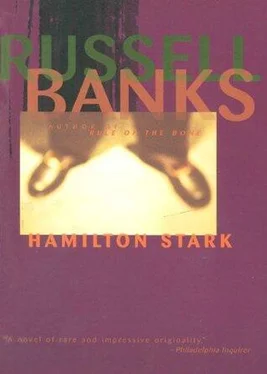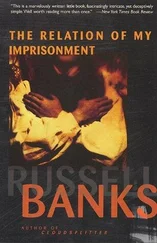Ham tried not to cry and finally succeeded and answered, “The fighting cocks killed Henry.”
“You forgot to close Jack’s cage this morning, and after you and your mother left, all hell broke loose. By the time I got out here, Jack had killed the rooster and scared the hens so bad they probably won’t lay till spring.”
Ham said that he was sorry. He said it several times because it felt strange to him when he said it, almost as if he didn’t mean it, as if somehow he were glad that Henry was dead and the hens wouldn’t lay.
His father told him that being sorry never changed anything in this world. Never. “So the first thing you’re going to do is buy a new rooster for those hens. If we’re lucky we’ll get them laying again. It’ll probably help if we put the fighting cocks out in the barn right away, so this afternoon I’ll build a couple of coops for them out there. Up to now I kept them in here because it was easier for you to feed them all at once. Now it’ll be harder for you,” he said grimly.
“How much will a new rooster cost?” Ham asked, knowing the answer even before he heard it.
“Two or three dollars,” his father said, flicking his cigarette butt into the snowbank and heading for the house.
Ham stood there alone for a few seconds and then started running to catch up to his father, who had almost reached the house.
THE DRUNKEN PIGS
In certain years the family raised a pig. Always Poland China pigs. But there was a period of about five years when they were raising two pigs, every spring butchering the older of the two and replacing it immediately with a young one. In two years that pig would weigh one hundred and fifty pounds or more, and its turn, as the older of the pair, would have arrived.
By that time Ham, whose responsibility it was to feed them, would’ve grown attached to the bristly, pinkish white beast, so he was grateful that every time his father and Archie Carr, the butcher, packed one of the pigs into the back of Archie’s truck and drove off with it, they left behind a football-shaped and — sized piglet, so small it had to be fenced separately for a while to protect it from the clumsy, thrashing bulk of the remaining adult pig.
“Pigs don’t get along until they’re about the same size,” Ham’s father had explained. “Like people.” Then he had laughed down lightly at his son, and touching the boy’s coal black hair with his enormous fingertips he said, “Naw, not like people.”
Ham knew that they raised the pigs to kill and eat and that it saved them a lot of money. It was wartime, and even though his father worked hard every day as a plumber, Ham knew that they were poor, so he tried to think about the pigs the way he thought about the vegetable garden.
It wasn’t easy. The pigs themselves made it difficult for him. They had too much character for it. Certainly they rooted like potatoes in the dark ground of the pigpen, but sometimes Ham would stand on the rough board fencing of the pen and watch them snuffle through the dirt, and when the pigs realized that he was there, they’d stare up at him and wrinkle the loamy surface of the dirt with their buried noses, as if signaling to him. Besides, the pigs ate potatoes — or at least they ate the peelings, whole buckets of them, left over from Ham’s mother’s cooking at the end of each week.
And yes, it was true that the pigs were in fact shaped more like a summer squash than anything else — they surely weren’t shaped like animals, or people. Rounded at the ends, long and smooth-sided, so fat their tiny legs in soft ground were almost invisible, with a tendril-like tail at one end and leafy ears at the other, it should have been easy to think of them as nothing more than gigantic pinkish summer squashes. Except of course that they ate squashes, ate greedily the seedy cores that Ham’s mother scraped away when she was canning for the winter.
Another thing that made it hard for Ham to think of the pigs in the same way he thought of the vegetables from the garden was that the pigs made noises, grunts and loud, high squeals, which Ham thought he understood. One time the pigs broke loose from the pen and were very hard to find and catch because, once loose, they remained silent and out of sight. But when Ham’s mother discovered one of them rummaging noiselessly through her geranium bed over on the shady side of the house, the pig had started squealing loudly and had headed straight for the pigpen. The other pig, the older one, had wandered out behind the barn and had fallen through the wooden platform that covered an old unused well back there. Twelve foot down, standing in a foot of water in total darkness, the pig remained silent until Ham and his father, seeing that the cover had been broken, walked over to the well and peered down, and only then did the pig begin to squeal for help.
Also, the pigs liked Ham. Or at least it seemed to him that they did. They let him scratch their dry, scaly backs and smooth foreheads and often came to the fence when they saw him there. In calm silence the beasts would poke their snouts between the slats, and he would scratch them. One pig would even let Ham place two fingertips of one hand a short ways into its nostrils, dime-sized openings, as long as with his other hand the boy kept scratching the bony ridge of the snout.
They tried not to name the pigs. His father had pointed out that if they didn’t give them names, it would help Ham avoid becoming too fond of them. “They’re not pets. Remember that. No more reason to name a pig you’re going to eat in a year or two than name a damn apple tree,” he had explained.
Ham’s mother had agreed, but later, when Ham accidentally revealed to her that on his own he had secretly continued naming the pigs year after year, she had merely smiled. Because he had referred to only one of the pigs by name, Anne, she asked him the name of the other.
“Tricksie. I named her that because she looks like the one we had two years ago, and her name was Tricksie too,” he told her, pointing out the pig’s unusually long snout and small ears.
“Tricksie and Anne. Why Anne?”
“I don’t know. It just seemed to fit her,” he said. Then he asked her not to tell his father that he had named the pigs, and she assured him that she wouldn’t.
The September that Tricksie began her final season as a pig and Anne was more than half-grown, Ham and his mother harvested an unusually large crop of grapes. They were Concord grapes, large and purple and darkly sweet, that grew from several clusters of vines in front of the garden and along the south-facing side of the road.
For a week, every afternoon when school was out Ham would step down from the school bus and walk to the grapevines and work alongside his mother until suppertime. These were warm, pleasant afternoons for him, picking the dusky grapes in the golden September sunlight, talking quietly with his mother as they worked, chatting of school, his friends, his new teacher. He also liked asking her about what he was like when he was a baby, and she apparently enjoyed telling him. He asked her why she didn’t have another baby, and she said, “Maybe I will,” in such a way that he figured it was a decision. And that turned out to be the year before his sister Jody was born.
When he and his mother had finally picked all the grapes, having stored them each night in close-woven baskets in the cellar, his mother started making jelly with them. She’d never made grape jelly before, had never gathered a large enough crop, and she was excited at the prospect. She washed the grapes, and squashed them, and separated the skins and seeds from the pulp, the pulp from the juice. She saved the juice in Mason jars and used the cleaned pulp for the jelly. The skins and seeds, sloshing thickly in a five-gallon tub like a purple stew, she decided to feed to the pigs.
Читать дальше












